You have to work at it to find Christmas, but it’s worth looking for. If it weren’t, its absence wouldn’t hurt so much. Because what we are looking for has something to do with our childhood advent calendar with the little doors opening one by one, the mechanical store-window displays seen from Daddy’s shoulders, the choirs with candles, the green plush dinosaur under the tree, the eyes springing open at dawn and the bounce bounce bounce on Mommy and Daddy’s bed. But familiarity robbed us of our anticipation long ago. The sorrow starts younger than you let on, if you’re good; you tuck the secret away in your gut, that you aren’t as excited as the grownups are counting on you to be, because you already know it’s your job to pull them through their own loss. You pretend best you can, you light up your eyes to see theirs shine too. And that tiny, well-meant deception puts you on the road to one of life’s most faithful disappointments.
Because what you really want is not the green plush dinosaur, but the heart that can barely contain the joy of it. Because what you really want is to be flanneled and folded and fit in Mommy’s lap, knowing her heart can barely contain the joy of it. What you really want is not at the mall, but if you know where to look, you can get enough to go on. Music is a good start. It’s why we go to Tuba Christmas.
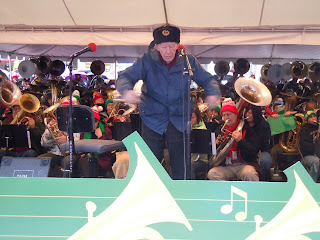 That’s outdoors in the square downtown, the one some child whose joy is gone tried to blow up a few weeks ago. It’s December in Portland; it’s dumping rain. There are over two hundred tuba players of all ages there, scavenged from all over town and corralled under a canopy. We watch as, with some difficulty, an antique conductor is installed on the dais. He is revered by the musicians, many of whom he has taught, and they smile at him with love and embarrassment. This is the highlight of his year, and he wants to talk. He wants to talk a lot, to teach some more, and to crack wise with comic timing honed in the nineteenth century, the punchline expected later in the month when the stage comes through. And we citizens of Portland stand in the downpour, our shoes filling with water, screaming inside tuba tuba tuba, and we smile in his direction, until finally he totters around to face the players–no–he turns around again, he forgot to mention something–and then, at last, he slowly lifts his arms and releases the tubas. There are virtuosos, but it is not the nimblest of instruments, and a large and democratic volunteer force of them is best reined in at a safer speed. Still, they are magnificent, even while lumbering through Joy To The World, even if Deck The Halls is done as a dirge. Magnificent, I say, the big marching tubas hoonking away in the rear like a troupe of flatulent mastodons; and the crowd politely covers their smiles when the antique conductor’s pants fall down and he is assisted by a spectator in the front row.
That’s outdoors in the square downtown, the one some child whose joy is gone tried to blow up a few weeks ago. It’s December in Portland; it’s dumping rain. There are over two hundred tuba players of all ages there, scavenged from all over town and corralled under a canopy. We watch as, with some difficulty, an antique conductor is installed on the dais. He is revered by the musicians, many of whom he has taught, and they smile at him with love and embarrassment. This is the highlight of his year, and he wants to talk. He wants to talk a lot, to teach some more, and to crack wise with comic timing honed in the nineteenth century, the punchline expected later in the month when the stage comes through. And we citizens of Portland stand in the downpour, our shoes filling with water, screaming inside tuba tuba tuba, and we smile in his direction, until finally he totters around to face the players–no–he turns around again, he forgot to mention something–and then, at last, he slowly lifts his arms and releases the tubas. There are virtuosos, but it is not the nimblest of instruments, and a large and democratic volunteer force of them is best reined in at a safer speed. Still, they are magnificent, even while lumbering through Joy To The World, even if Deck The Halls is done as a dirge. Magnificent, I say, the big marching tubas hoonking away in the rear like a troupe of flatulent mastodons; and the crowd politely covers their smiles when the antique conductor’s pants fall down and he is assisted by a spectator in the front row.
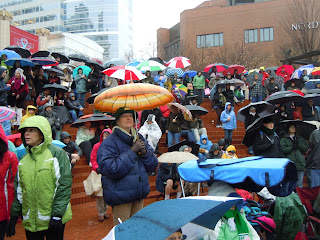 There’s an attempt to get the crowd to sing along, only to our horror it is not “along,” but a cappella, our verse framed but not accompanied by tubas. The conductor is under the canopy and hard to see, and the pace the tubas have set for us is glacial. The angels we could hear on high, who couldn’t see the conductor at all, had to wing it. Other factions selected their own tempos according to how cold they were, and by the time heav’n and nature sang, the group closest to the conductor had been lapped twice. There was nothing professional about it, any of it, and when the conductor remembered an interesting historical footnote and laboriously turned around to inform us of it, I looked back at the audience: every one of us wet as muskrats, children stomping puddles as quietly and decorously as possible. You could try to think of rain as God’s tinsel if you want, but it’s cold, and hard to festive it up. Yet everybody is smiling patiently, jiggling for heat, because not one would deny a kindness to an old tuba player at the close of his life; it’s the bookend to our first Christmases, and it’s what we have to give. And when the tubas break out in the most magnificent hymn of all, a hymn with the majesty to match the tempo, there’s a moment in it: the soaring come and adore him, born the king of angels, the measure where your voice and your heart both break at once. That’s your childhood shining through the fracture. It’s okay to weep for it.
There’s an attempt to get the crowd to sing along, only to our horror it is not “along,” but a cappella, our verse framed but not accompanied by tubas. The conductor is under the canopy and hard to see, and the pace the tubas have set for us is glacial. The angels we could hear on high, who couldn’t see the conductor at all, had to wing it. Other factions selected their own tempos according to how cold they were, and by the time heav’n and nature sang, the group closest to the conductor had been lapped twice. There was nothing professional about it, any of it, and when the conductor remembered an interesting historical footnote and laboriously turned around to inform us of it, I looked back at the audience: every one of us wet as muskrats, children stomping puddles as quietly and decorously as possible. You could try to think of rain as God’s tinsel if you want, but it’s cold, and hard to festive it up. Yet everybody is smiling patiently, jiggling for heat, because not one would deny a kindness to an old tuba player at the close of his life; it’s the bookend to our first Christmases, and it’s what we have to give. And when the tubas break out in the most magnificent hymn of all, a hymn with the majesty to match the tempo, there’s a moment in it: the soaring come and adore him, born the king of angels, the measure where your voice and your heart both break at once. That’s your childhood shining through the fracture. It’s okay to weep for it.

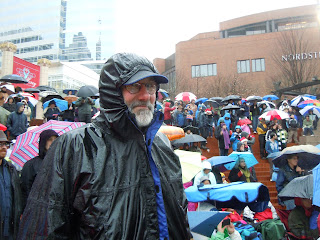
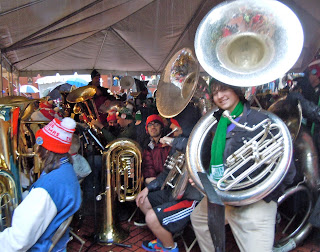
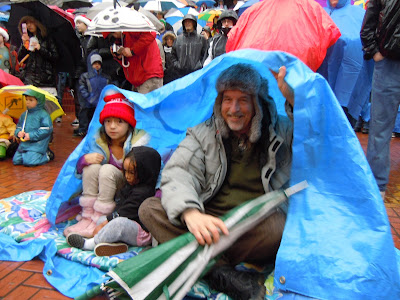
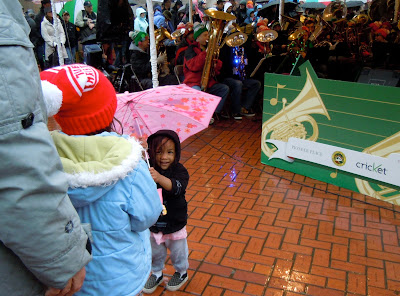
True. About what we really want. True. And it does fade sooner than we let on.
But — "Tuba Christmas"? Portland really does deserve its reputation as "weird." But I enjoy weird. I even enjoy old men who "crack wise with comic timing honed in the nineteenth century, the punchline expected later in the month when the stage comes through." As long as it's not too often.
And it's not raining.
Merry Christmas.
Lovely, and loving. Thank you. Merry Christmas!
This was the best Christmas gift I've received. In addition to the wit, it also served me up a portion of wistfulness. A laugh and a poignant sigh – what more could I ask? Thank you and merry Christmas!
You brought me there, and I saw that old conductor's pants fall down. Now there's a joyful memory! Just what I needed to read this lovely Christmas morning.
Yep, it's a Murr-y Christmas! Love ya, Elaine
Well….you done nailed it again! I mean, the part about wanting the "heart that can barely contain the joy".
I like the idea of a Tuba Christmas, but jeez, all that rain is a real buzz-kill. Maybe if I lived there, I would get used to it. Or maybe I'd just stay in a state of psychotic depression.
In any event, thanks for such a wonderful Christmas gift, and Happy Holidays!
And I did. Thanks.
My particular denomination celebrates "Banjo Christmas", but to each his own.
Very sweet, Murr. But did you really have to include a scatalogical reference even here? It's Christmas, my dear, show some charity. 😉
"…hoonking away in the rear like a troupe of flatulent mastodons."
The voice and heart cracking really got me! Christmas is never where you're looking for it. I got to play the piano in the lobby at our church this year between services. I practiced up on the carols and even some fun jazz versions, but somehow it didn't seem to make as much impact on the milling crowd as I wanted, everybody's too cool for that I guess. Then after the last service I looked over and saw two little 8-year-old girls standing beside me at the bench. "Do you know Holly Jolly Christmas?" I didn't. But I learned quick.
p.s. Love your labels – I do believe a Google search for "Christmas", "flatulent mastadons", and "sorrow" will always and forever only return this story.
That's the most touching Christmas story I've read in many, many years.
Just absolutely lovely. The first part rings true for me – my mom was Mrs. Christmas herself. It was hard to match her joy for joy & most of the time I was left far behind.
LOVE the Tuba Christmas! So tender & ludicrous – it's just great.
We're getting a lot of snow here at my dad's house in NC – a Christmas miracle.
So much contained here, some of it barely contained. And thanks for the honesty. People who say they love Christmastime have always scared me a little. One nice thing about having kids around is being able (nay, obliged) to pour oneself into making it fabulous for *them,* and finding in the pouring that you get to skate along in their joy slipstream. Liam kept a countdown on the refrigerator dry-erase board that started at Day 65. My heart started to sink around Day 21…could we possibly come through to the extent and breadth of his hope? By Day 8 we knew we could, and my heart no longer bottomed out looking at that number he carefully erased and rewrote every morning. Still, I feel about Christmas like my father-in-law, who asked me tonight, "Couldn't we do this every *other* year?" That would be more than enough!
Hugs to Murre tonight. Love, JZ
What a Christmas treat. You are always in the thick of it Murr, and bring the fun to us. Thank you, and I can't wait to see what craziness you stir up for us in 2011! I'll be along for the ride.
Oh, my dear conductor friend, a fine and funny man, top tuba player for many years with the Portland Symphony, collector of antique instruments, brilliant player of all, conductor of college and community bands, music and education prof. Times are harder for him now. I studied music history and how to play all the band instruments from him back in the you-don't-want-to know time. Or maybe I don't want you to know. When I came back to live in Portland after many years away, I went to his tuba Christmas and came up to greet him afterwards. He knew me at once and wrapped his arms around me. Dear man. For that kind of memory when I get to my nineties!
Dr. John Richards, 92 years old, may he have a merry Christmas. And also all you Friends Of Pootie out there.
Your story over-filled my heart in that way of long-ago childhood Christmases
when the stars overhead were amazing, and if you could fall asleep you awoke to the smell of oranges and something only dreamt of under the tree.
Beautiful, my friend. You absolutely touched the heart of the holiday. And yes, we do have to work at Christmas we we grow older, but it's so worth it.
Love your tuba tradition. Portland seems to be a city still blessed with small-town values. This sounds like many of the events we hold here in my tiny rural community.
The best read I've enjoyed all week. Merry, Merry Christmas, Murr. (My Dad played Tuba) 😉
Thank you, Murr. You always strike at the heart. Christmas is a lot like marriage. It may not live up to your expectations, but if you approach it right, there's nothing else to compare with it, and I wouldn't want to give it up.
Murr, Christmas isn't any material thing, is it, but a spirit made up of wonderful essences like compassion and kindness, undefinable magics and hope. That spirit just wove itself all through your post and floated out into this reader's heart. Thank you.
You really hit the part of Christmas none of us want to contemplate. Christmas is for children and the child part of us will always mourn the days of expectation and joy. When our own children are gone this space of time in the year is always imprinted with joy, side-by-side, with utter loneliness.
Looks cold.
Beautiful prose, all of it – but I can't get past the "200 tuba players." Really? That's beyond imagining.
You've done it again, Murr. This spoke to me on so many levels. Christmas is an extremely painful time of year for me. It is a reminder of what I lost forever, what I should've had for a few more years than I did, and the relentless Xmas hype of the perfect family celebrating the perfect Christmas together in their perfect home just rubs my nose in it even more. Next year I will think of flatulent mastodons and perhaps because of the laughter, I'll forget to cry.
" the one some child whose joy is gone tried to blow up a few weeks ago" I just have to add: with a lot of help from the fbi.
Wonderful post, as always. I never knew about the tuba christmas and I have lived here for over forty years! On the list for next year.
You've done it again, Murr. This spoke to me on so many levels. Christmas is an extremely painful time of year for me. It is a reminder of what I lost forever, what I should've had for a few more years than I did, and the relentless Xmas hype of the perfect family celebrating the perfect Christmas together in their perfect home just rubs my nose in it even more. Next year I will think of flatulent mastodons and perhaps because of the laughter, I'll forget to cry.
Thank you, Murr. You always strike at the heart. Christmas is a lot like marriage. It may not live up to your expectations, but if you approach it right, there's nothing else to compare with it, and I wouldn't want to give it up.
The best read I've enjoyed all week. Merry, Merry Christmas, Murr. (My Dad played Tuba) 😉
Lovely, and loving. Thank you. Merry Christmas!
This is really interesting, You are a very skilled blogger. I’ve joined your feed and look forward to seeking more of your wonderful post. Also, I have shared your website in my social networks!
carpet cleaners sydney
"Hearts that can barely contain the joy" (sic) is a phrase I've been looking for all my life. And my favourite living wordsmith has gifted it to me in a most timely way.
Bless you and your keyboard Murr – but most of all for your worldview and your heart. x
Merry Christmas, Simon.